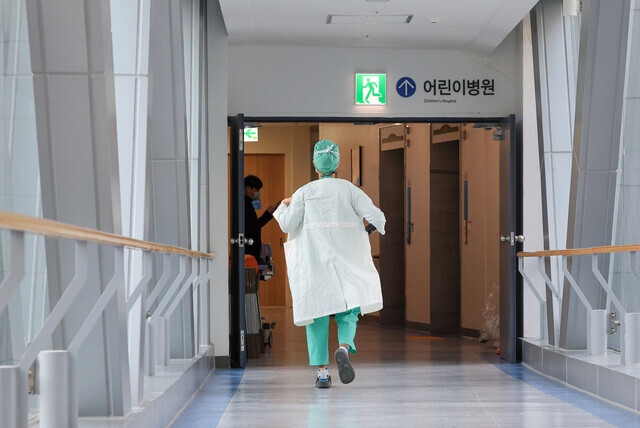hankyoreh
Links to other country sites 다른 나라 사이트 링크
Korea plans to enable physician assistants to pick up slack left by absent doctors

To fill the vacuum left by the mass resignations of medical residents and interns protesting government policies, South Korean President Yoon Suk-yeol has declared his intentions to utilize physician assistants (PAs) to treat critical patients in major hospitals.
PAs, known commonly in Korea as PA nurses, often perform the duties of a doctor in the field but are not protected by the laws that guarantee the rights of licensed medical doctors, which leaves them in legal limbo. Yoon has pledged an expenditure of 128.5 billion won (US$96.7 million) to subsidize the hiring of additional medical personnel, and to dispatch public health doctors and military medical officers to hospitals suffering critical staff shortages.
Presiding over a meeting of the Central Disaster and Safety Countermeasures Headquarters on Wednesday, Yoon pledged to “administratively discipline doctors who have betrayed their duty and endangered the lives of patients while strengthening the nation’s emergency healthcare system to fill the current medical vacuum.”
“We also need to provide a legal framework that will protect nurses when they need to fill the void when doctors aren’t readily available,” he said.
The Ministry of Health and Welfare is expected to draft legal guidelines that specifically outline the duties that PAs can perform legally and distribute them to hospitals as early as Friday. The intent is to prevent PAs from facing legal repercussions for performing the duties of a medical resident or intern in an urgent situation.
Current laws dictate that nurses must perform duties under doctor supervision, but the laws concerning PAs are ambiguous. The Korean Medical Association (KMA) opposes a legal framework that would allow PAs to perform the duties of medical doctors, yet the president is directly intervening against their wishes. A legal and policy framework dictating the professional spectrum of PAs is likely to be included in a future amendment of the Medical Service Act.
On Wednesday, the government announced emergency health care measures to respond to the mass resignations of medical residents and interns. During a Cabinet meeting, the administration approved an emergency fund of 128.5 billion won (US$96.7 million) to finance the measures. The funds will be used to subsidize labor costs (58 billion won, or US$43.6 million) for medical fellows and professors who are filling the vacuum left by the residents and interns. They will also cover operational costs for public hospitals and provincial medical centers that have extended their weekday and weekend hours while canceling their days off (39.3 billion won, or US$29.5 million).
The state will also dispatch 150 public health doctors and 20 medically licensed military surgeons to hospitals with severe personnel shortages (5.9 billion won, or US$4.4 million). They will mostly be sent to hospitals attached to their alma mater or the hospitals where residents and interns were training.
The state will also call on medical institutions nationwide to cooperate in a plan to distribute non-critical patients from the country’s top hospitals to less crowded ones (4 billion won, or US$3 million)
Yet some medical fellows and professors have joined the mass resignation movement to protest government policies. If that trend continues, the state’s emergency health care system will be insufficient to fill the current vacuum in medical care.
By Cheon Ho-sung, staff reporter; Lim Jae-hee, staff reporter; Kim Yoon-ju, staff reporter
Please direct questions or comments to [english@hani.co.kr]

Editorial・opinion
![[Editorial] Perilous stakes of Trump’s rhetoric around US troop pullout from Korea [Editorial] Perilous stakes of Trump’s rhetoric around US troop pullout from Korea](https://flexible.img.hani.co.kr/flexible/normal/500/300/imgdb/original/2024/0509/221715238827911.jpg) [Editorial] Perilous stakes of Trump’s rhetoric around US troop pullout from Korea
[Editorial] Perilous stakes of Trump’s rhetoric around US troop pullout from Korea![[Guest essay] Preventing Korean Peninsula from becoming front line of new cold war [Guest essay] Preventing Korean Peninsula from becoming front line of new cold war](https://flexible.img.hani.co.kr/flexible/normal/500/300/imgdb/original/2024/0507/7217150679227807.jpg) [Guest essay] Preventing Korean Peninsula from becoming front line of new cold war
[Guest essay] Preventing Korean Peninsula from becoming front line of new cold war- [Column] The state is back — but is it in business?
- [Column] Life on our Trisolaris
- [Editorial] Penalties for airing allegations against Korea’s first lady endanger free press
- [Editorial] Yoon must halt procurement of SM-3 interceptor missiles
- [Guest essay] Maybe Korea’s rapid population decline is an opportunity, not a crisis
- [Column] Can Yoon steer diplomacy with Russia, China back on track?
- [Column] Season 2 of special prosecutor probe may be coming to Korea soon
- [Column] Park Geun-hye déjà vu in Yoon Suk-yeol
Most viewed articles
- 1‘Free Palestine!’: Anti-war protest wave comes to Korean campuses
- 2[Editorial] Perilous stakes of Trump’s rhetoric around US troop pullout from Korea
- 3Korean president’s jailed mother-in-law approved for parole
- 4Nuclear South Korea? The hidden implication of hints at US troop withdrawal
- 5In Yoon’s Korea, a government ‘of, by and for prosecutors,’ says civic group
- 6[Photo] ‘End the genocide in Gaza’: Students in Korea join global anti-war protest wave
- 7Behind-the-times gender change regulations leave trans Koreans in the lurch
- 8Korea likely to shave off 1 trillion won from Indonesia’s KF-21 contribution price tag
- 9With Naver’s inside director at Line gone, buyout negotiations appear to be well underway
- 1060% of young Koreans see no need to have kids after marriage